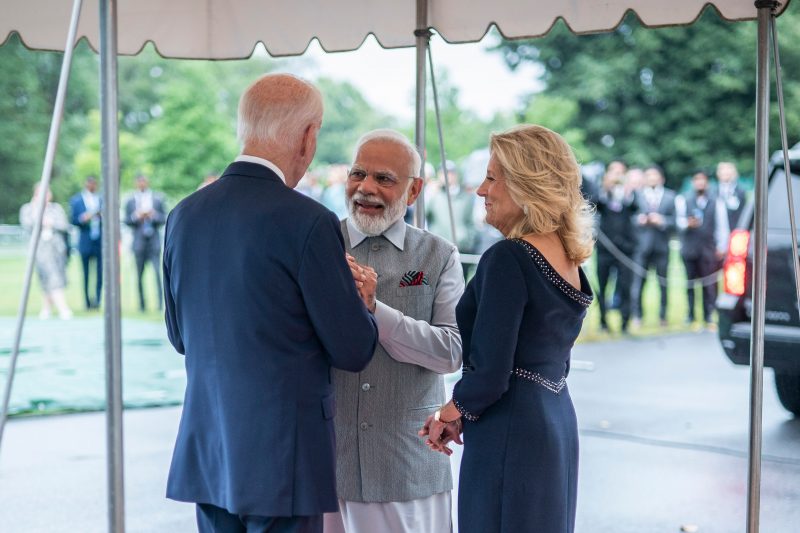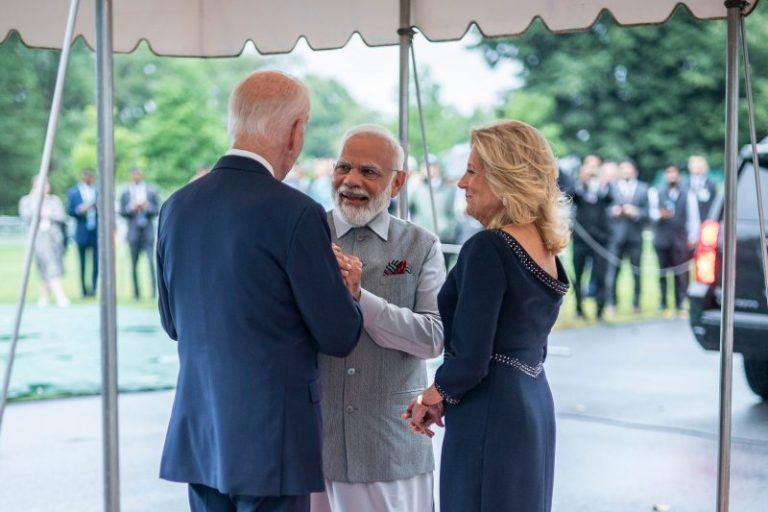
Prime Minister Narendra Modi of India will visit President Biden at the White House on Thursday for a state visit featuring both fanfare and substance, highlighting the growing importance of the U.S.-India relationship at a time of geopolitical turmoil.
Modi, who is just the third world leader Biden has hosted for a state visit, is seeking to bolster his country’s global standing, which White House officials say could in turn benefit U.S. interests. Modi is scheduled to join Biden for a meeting in the Oval Office, engage in a brief joint press conference, address a joint session of Congress, attend a state dinner and hold a separate meeting with Vice President Harris.
White House aides say the packed schedule — including a long list of expected agreements on issues including technology, trade and defense — reflects India’s increasingly prominent role in global affairs and Washington’s desire to boost ties with the world’s most populous nation, in part as a bulwark against China.
“We expect this will be a historic visit,” said Jake Sullivan, the White House national security adviser. “It will reflect the fact that the United States and India have a natural partnership between our two countries, between our two peoples, and that this will be one of the defining relationships of the 21st century.”
The trip marks the third official state visit for any foreign leader during Biden’s presidency, following similar events for French President Emmanuel Macron and South Korean President Yoon Suk Yeol. Modi, who addressed U.S. lawmakers in 2016, is one of only a handful of world leaders who have been invited twice to address a joint session of Congress.
Biden and Modi, who also had a private dinner on Wednesday evening, are set to announce new partnerships on defense and technology during the trip. Major deliverables include a deal to jointly produce a GE fighter jet engine in India and efforts to shore up supply chains for microchips and other key technologies.
Other topics, including the war in Ukraine, relations with China, trade and immigration are also likely to be discussed, officials said.
Thousands of Indian Americans plan to greet Modi during his visit, which will include an elaborate arrival ceremony on the South Lawn of the White House on Thursday and separate engagements by Modi with members of the Indian diaspora and the U.S. business community.
The prime minister’s visit comes at a notable time for Indian Americans. Besides Harris, the sitting vice president, two Republican presidential candidates are also of Indian descent: former South Carolina governor Nikki Haley and biotech entrepreneur Vivek Ramaswamy.
Despite the pomp and pageantry, the visit is not without controversy. Human rights groups, lawmakers and scholars have written open letters to the White House and published opinion pieces in top U.S. media outlets calling out the erosion of democratic principles in India on Modi’s watch.
They have pointed to a rise in the persecution of India’s Muslim minority, the repression of journalists, the proliferation of bigoted rhetoric and attacks on freedom of speech since Modi’s rise to power in 2014. The U.S. State Department and several independent groups have highlighted such problems in reports and statements, saying the situation has grown worse in recent years.
Modi has denied that such anti-democratic trends are widespread in India.
But in an open letter, more than 70 members of Congress urged Biden to use his meeting with Modi to address political violence, internet shutdowns, restrictions on press freedom and other “troubling signs” in the world’s largest democracy.
“As longtime supporters of a strong U.S.-India relationship, we also believe that friends can and should discuss their differences in an honest and forthright way,” the lawmakers wrote. “That is why we respectfully request that — in addition to the many areas of shared interests between India and the U.S. — you also raise directly with Prime Minister Modi areas of concern.”
Daniel Markey, a senior adviser at the U.S. Institute of Peace and a former State Department official, said it is important for Washington to cultivate closer ties to India. But he criticized former president Donald Trump — and now Biden — for lavishing praise on Modi personally.
“It was bad enough with a Trump administration that didn’t seem to care at all about democratic values, but there’s now an even deeper dissonance with a Biden administration that has said democracy should be at the core of how it makes foreign policy,” Markey said.
Sullivan said that Biden always brings up human rights and democracy during meetings with foreign leaders and that this visit would be no different. At the same time, he said, there is limited value in the United States trying to lecture Modi on the importance of democratic principles.
“As countries, as societies, as polities, my personal view is the best way to do that is to have candid, robust discussion not just between our governments, but between our civil societies, between our activists, between our journalists,” Sullivan said.
In the lead-up to the visit, U.S. officials lobbied the Modi government to agree to participate in a joint press conference, something the Indian leader has not done in years, officials said. On Wednesday, the White House announced that Modi and Biden would indeed take questions from reporters.
Yet officials expect Modi and Biden to take one question each, less than the typical two-by-two press conference during most state visits, in which two reporters from each country ask questions of the leaders.


Comments are closed.